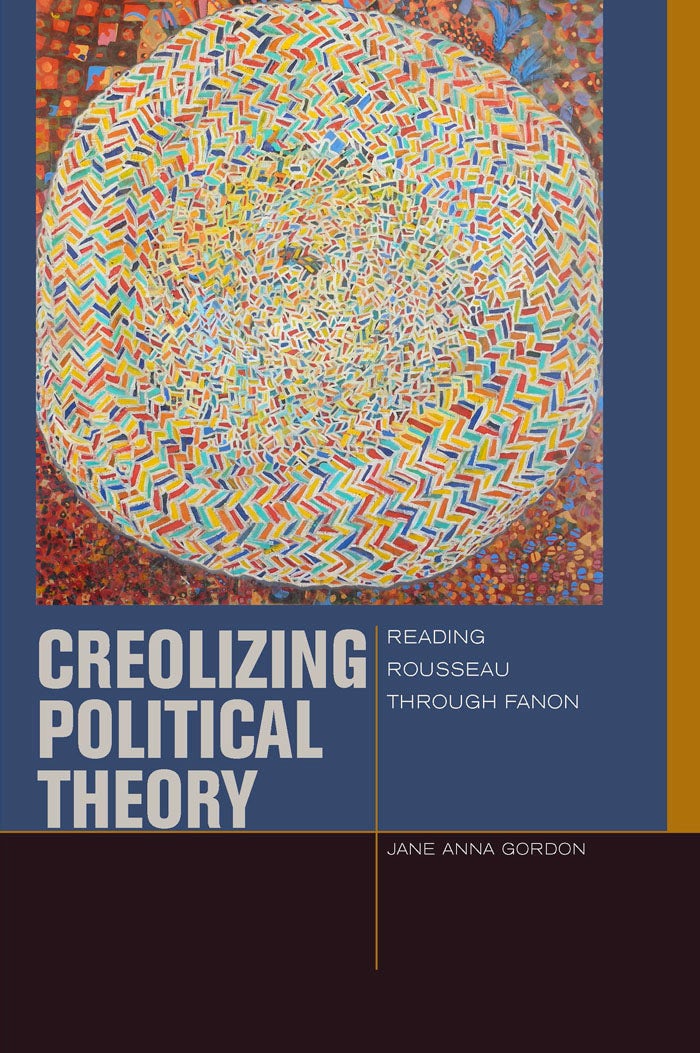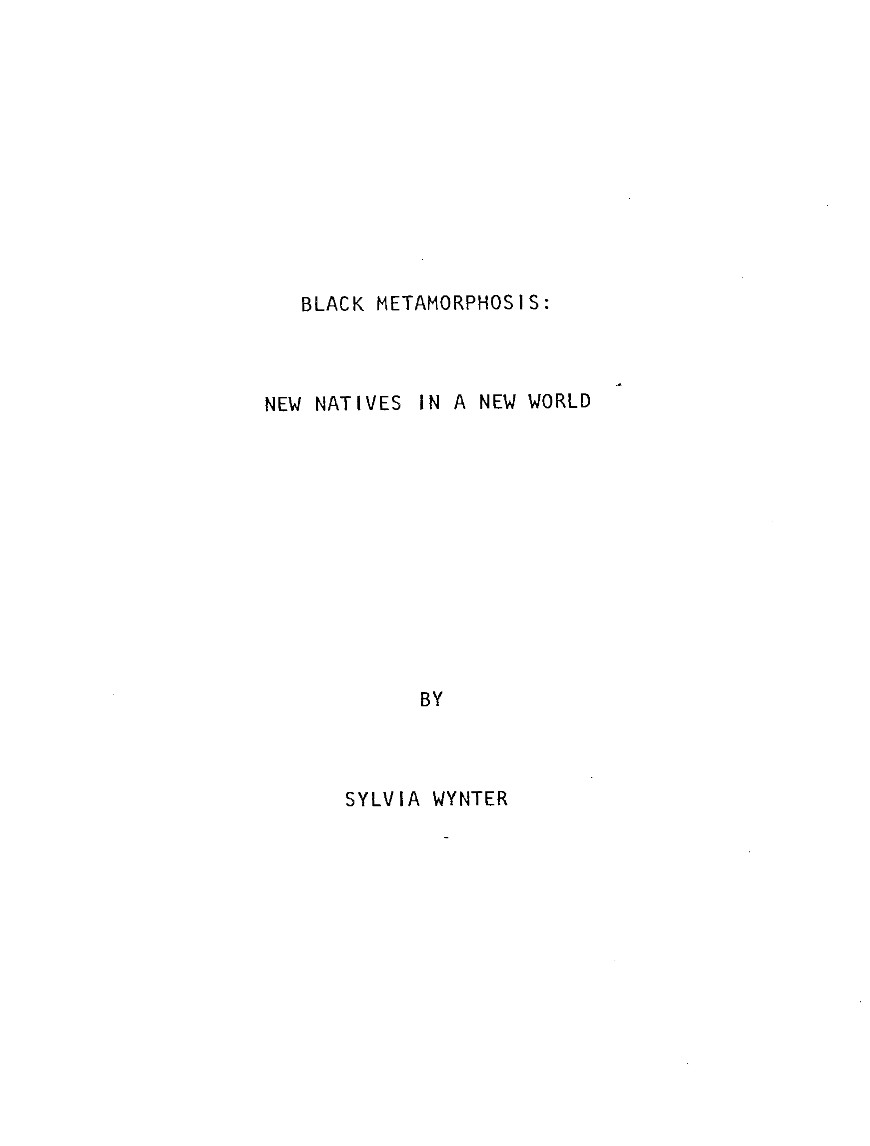Jane Anna Gordon: Creolizing Political Theory: Reading Rousseau through Fanon (2014)
Filed under book | Tags: · black people, colonialism, creolization, decolonization, freedom, governance, law, modernity, political theory, politics, power, race, theory

“Might creolization offer political theory an approach that would better reflect the heterogeneity of political life? After all, it describes mixtures that were not supposed to have emerged in the plantation societies of the Caribbean but did so through their capacity to exemplify living culture, thought, and political practice. Similar processes continue today, when people who once were strangers find themselves unequal co-occupants of new political locations they both seek to call “home.”
Unlike multiculturalism, in which different cultures are thought to co-exist relatively separately, creolization describes how people reinterpret themselves through interaction with one another. While indebted to comparative political theory, Gordon offers a critique of comparison by demonstrating the generative capacity of creolizing methodologies. She does so by bringing together the eighteenth-century revolutionary Swiss thinker Jean-Jacques Rousseau and the twentieth-century Martinican-born Algerian liberationist Frantz Fanon. While both provocatively challenged whether we can study the world in ways that do not duplicate the prejudices that sustain its inequalities, Fanon, she argues, outlined a vision of how to bring into being the democratically legitimate alternatives that Rousseau mainly imagined.”
Publisher Fordham University Press, New York, 2014
Just Ideas series
ISBN 9780823254811, 082325481X
xv+294 pages
Reviews: Anne Norton, Sharon Stanley, Fred Lee, Thomas Meagher (with author’s response, Contemporary Political Theory, 2018).
See also: Forum on Creolizing Theory (ed. Lewis R. Gordon, Journal of French and Francophone Philosophy, 2017), The Creolization of Education, Pedagogy, and Political Theory (ed. Lewis R. Gordon, Review of Education, Pedagogy, and Cultural Studies, 2018).
Catherine Flood, Gavin Grindon (eds.): Disobedient Objects (2014)
Filed under catalogue | Tags: · activism, design, direct action, disobedience, object, politics, protest, social movements, solidarity

“This book explores the material culture of radical change and protest – from objects familiar to many, such as banners or posters, to the more militant, cunning or technologically cutting-edge, including lock-ons, book-blocs and activist robots. Focusing on social movements since 1980, the book features an introductory essay by the curators examining the history of objects in protest and activism, followed by six essays that look at particular objects, and the contexts in which they are used. It demonstrates how political activism drives a wealth of design ingenuity and collective creativity that defy standard definitions of art and design. Accompanies the V&A exhibition Disobedient Objects, July 2014 to February 2015.”
With essays by Mark Traugott, Anna Feigenbaum, Francesco Raparelli, David Graeber, Nicholas Thoburn, and Ana Longoni.
Publisher V&A Publishing, London, 2014
ISBN 9781851777976, 1851777970
144 pages
Exh. review: Richard Taws (West 86th, 2014).
Book review: Thomas Snow (Object, 2015).
Exhibition
Exhibition blog
WorldCat
PDF (63 MB)
Comment (0)Sylvia Wynter: Black Metamorphosis: New Natives in a New World [1970s]
Filed under manuscript | Tags: · black people, body, caribbean, colonialism, critique, human, humanism, politics, resistance, slavery, theory

“Black Metamorphosis: New Natives in a New World is an unpublished manuscript written by Sylvia Wynter. The work is a seminal piece in Black Studies and uses diverse fields to explain Black experiences and presence in the Americas.
Throughout the 1970s and early 1980s, Wynter worked with the Center for Afro-American Studies (CAAS) at the University of California, Los Angeles (UCLA) to complete the project which was to be published by the Institute of the Black World. The manuscript presents early iterations of Wynter’s Theory of the Human and explores how Black experiences are essential to understanding the history of the New World.”
The only part of this manuscript that has been published is Wynter’s 1979 essay “Sambos and Minstrels”, though excerpts of and allusions to many of the other texts she wrote in the 1970s can be found in the manuscript, particularly “Jonkonnu in Jamaica” (1970), “Novel and History” (1971), “Ethno or Socio Poetics” (1976), “The Politics of Black Culture” (1977), and “In Quest of Matthew Bondman” (1981). … In the final 935-page manuscript, the page numbers break at page 251 and resume with page 370. The 120 missing pages correspond exactly to the number of pages in a series of descriptions of revolts by enslaved persons in Jamaica, and it appears that they were meant to be inserted at this point in the text.” (Kamugisha 2016)
Manuscript, written throughout the 1970s
[935] pages (252-369 missing)
Commentary and analysis: Derrick White (C.L.R. James Journal, 2010), Aaron Kamugisha, Demetrius L. Eudell, Greg Thomas, Katherine McKittrick, Tonya Haynes, Nijah Cunningham (Small Axe, 2016).
PDF (21 MB)
Comment (0)
